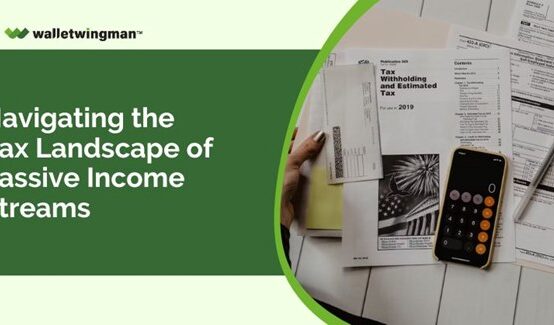Monetary income is always necessary when trying to make sustenance. However, given the current economic precarity, having only a single income becomes unfeasible. Because of this notion, the concept of passive income has garnered traction.
There’s no harm in earning extra money if you have the time and energy to put into the effort. Additionally, you can always put in the effort if you have an entrepreneurship idea that you deem resourceful.
But just like every other income, passive income is highly taxable, and the taxation slab varies from person to person and the form of payment you are delving into.
How to determine what passive income is?
Ideally, three kinds of nominal income are taxable in the general sense. They are active income, passive income, and portfolio income. When discussing passive income, it’s usually the income that occurred through rental property, limited partnership, and other business forms.
Additionally, interests gained through bonds, saving accounts, and other investments in any financial instrument fall under the category of it.
However, the definition of passive income taxes is different in the eyes of every financial organization in the world. For example, the IRS rules out interests, dividends, annuities, and derived royalties as passive income. So, let’s focus on the key elements:
- Passive is derived through independent work or resources and isn’t connected to any distinct employer or contactor.
- The income is ideally generated through payments such as interest on savings, cash backs, rewards, credit cards, rents, stock market, etc.
- It’s taxable depending on the scale of income and based on separate and distinct regulations.
Common Passive income sources: what are they?

As discussed above, many components comprise passive income, and since the concept can be construed as abstract, we’ll discuss some standard modes separately and elaborately.
1. Self-charged Interest
One of the most common forms of passive income is a self-charged interest which can be identified as payments made by a corporation or a partnership. In many countries, this income is charged as gross income and is taxable within the same bracket.
2. Rental Properties
Rental properties have always been a great source of passive income as they provide a regular basis of money. These can be from a single property or, in the case of real-estate businesses, through various channels and investments.
However, leasing a piece of land doesn’t count as passive income and is taxable under regular terms in the financial year.
3. Online Businesses
Selling unwanted stuff on websites like eBay and Yelp can also be considered a great and easy source of it. More importantly, this form of exchange isn’t taxable, and you can keep the transaction amount as an alternate source of income.
4. Cryptocurrency
While the advent of cryptocurrency in the economic stream, users have been afforded a significant source of passive income, and the returns have been monumental. Just in a few years, investors in cryptocurrency have gained massive returns.
In addition to being completely anonymous, crypto tokens are entirely decentralized, so you don’t have to pay any taxes, and the returns can be yours.

What are the overall benefits of Passive income?
1. Financial Security
The most significant benefit of passive income is that you don’t have to depend on a weekly or monthly paycheck. You can easily rely on your passive income to meet your sustainability.
Additionally, you have the financial freedom to take care of any other interest you want to pursue. With passive income, you have the independence to afford a specific time and energy in your ideas to fruition.
2. Meeting Economic Goals
Everyone, whether they are alone or have a family to take care of, must meet specific economic goals. This can be in the form of unavoidable bills, fees, and other needs.
Having a specific income can be jeopardizing as it restricts your ability to meet those goals.
With passive income, you can diversify your options and meet all your economic needs through the extra flowing amount.
Additionally, if you have spare cash, you can always invest it in the financial market for heavy and continuous monetary returns.
3. Improvement in Cash Flow
One of the most significant benefits of it is that it increases the overall cash flow into your daily budget. Without a continuous cash flow, it becomes tough to manage your expenses.
Additionally, your lifestyle also undergoes a drastic improvement because of the continuous and extra cash flow. Even though you must put in lots of time and energy to gain results, the outcome is very fruitful.
Since we have touched upon the benefits of passive income, it’s now pertinent that you analyze how they are taxable and what kind of extra payments you need to make for the income.
4. Reduction of Stress and Anxiety
Not being able to manage your monthly expenses can be associated with high stress and anxiety levels. With a regular cash flow with passive income, you can take care of your finances and significantly reduce stress and anxiety.

Passive Income and Taxation
1. Identifying the Stream
It doesn’t take a financial nerd to identify that the stream must be placed before taxing income. The financial institutions of different countries have different methods and slabs to tax every payment, and it is no other.
Direct investments in businesses and the private market are taxable differently. Higher taxes on it yields come between the 7% and 15% tax bracket ranges. Overall, the taxation of your passive income depends entirely on the source.
2. Rental Income
As mentioned above, multiple passive revenue streams are available from real estate. The three primary passive income sources in real estate are long-term rental yield, REIT dividends, and interest earnings on real estate crowdfunding.
Long term yield
The gross annual rent is initially calculated for long-term yield, and based on the parameters, the income is taxed. Next, only from the yearly gross rent, the taxes are deducted when paid by the owner.
Additionally, various add-ons and other taxable amounts are included in the provisions. Just check your area’s tax rules to determine the total amount.
Dividends from REITs
REITs or real estate investment trusts are mutual funds invested in stocks and comprise a significant feature in total passive income. Their taxability naturally falls under income from other sources, and the rates are typically charged.
Additionally, no extra tax is charged on commissions, brokerage, etc. However, interest expenditures on certain investments are taxable up to 20%
Interest Income from Real Estate Crowdfunding
Typically, peer-to-peer lending is ideally connected with real estate crowdfunding passive income. The developer who utilizes the property for this benefit is deemed the person who is liable for the payment of taxes.
Similarly, investors who have invested in these properties are also liable for taxes under the Gross Total income.
3. Dividends
Dividends on stocks, mutual funds, or other financial instruments comprise a significant portion of passive income. Even though the tax rates on these amounts vary according to different financial institutions, a certain percentage is always taxable.
Similar to rental properties, dividends are counted in the Gross total income slab rate and are taxed accordingly.
4. Self-employment Tax
Another form of tax that applies to passive income is the self-employment tax. This two-pronged tax applies to both the employer and employee and comes with relaxations on aspects like Medicare and social security.
So, what counts as self-employment for passive income?
- The revenue generated from a venture where you are the sole owner or independent contractor
- A partnership venture that indulges in proprietorship
- Part-time work, which is part of your venture.

5. Bonds
Bonds are financial instruments that are dependent on market forces and maturity dates. They are a good investment strategy because they diversify your portfolio and distribute income and risk.
When your bonds mature, you can decide whether to cash them or convert them into a new investment. When you cash them out, as many individuals do to augment their income, the money you make is regarded as passive income and is subject to regular taxation.
The tax rates are subject to rules and regulations specific to different countries and financial institutions. Some government bond schemes may be taxed, but overall, bonds are taxed at a standard rate.
6. Saving Accounts
Income through saving and fixed deposits have long been the go-to option for passive income, particularly for the high-interest rates and minimal losses. The material participation in such instruments is relatively low, and the rewards are high. Hence, they are taxable by the government.
Usually, an ordinary tax rate applies to saving accounts, depending entirely on whether your account is high-yielding or low-yielding.
Summary
You have significantly covered the various types of passive income and how they can be taxable. Depending on the information above, you can formulate your income strategy and manage your finances accordingly.
If some incomes are highly taxable, you can always look for other convenient sources to retain your passive income.


 Embrace the Digital Age: Exploring Chime Online Banking
Embrace the Digital Age: Exploring Chime Online Banking  Navigating the Tax Landscape of Passive Income Streams
Navigating the Tax Landscape of Passive Income Streams 